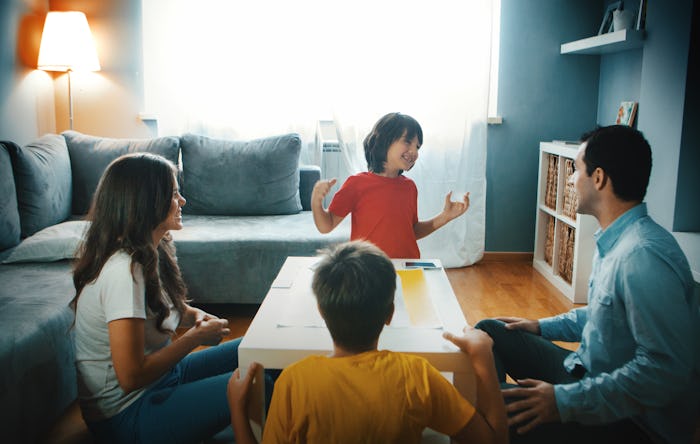Life

Here's How To Describe This Time Of Social Distancing To Your Kids
None of us have gone through anything like this quarantine. The impact and effects of COVID-19 are unlike anything we've seen before, and we don't have language for it. For parents, it's especially difficult. What should we be calling the quarantine to our kids? Is there a specific phrase we should use to explain social distancing to kids?
Kids are sensitive to language. Calling the quarantine something like a "lockdown" makes them think of the terrifying drills they endure at school. (A nightmare for another story.) "Quarantine" seems less scary, but also like a bit like a vocabulary word that is just out of reach for most kids. It's not descriptive unless you know the meaning of the word in an organic way. My 8-year-old daughter understands what's happening, but at first didn't have the precise language required to describe it. She simply said "We are all grounded because people can't listen and are bad at coughing into their elbows." Truer words, right?
I contacted psychologists to help understand, because parents need to know what they should be calling the quarantine with their kids, because it's a huge part of their lives now. Dr. Sheryl Ziegler, a psychologist and registered play therapist, tells Romper that because this is changing their lives so dramatically, kids are going to have questions, and this is a potential learning moment. “Although kids are used to hearing the terms quarantine and lockdown, you could use Social Distancing or just 'a long time out at home' instead," she says. "A great place to start the conversation is to ask your child, ‘what have you heard, what are you worried about and what do you want to know?’"
Kids absorb more than we think. As we have all been tied to our televisions each day, watching the President's or our Governor's updates (Governor Cuomo is on in the background at my house right now), our kids are not ignorant of what's happening. Avital K. Cohen, a psychologist, tells Romper that understanding our children's feelings, and how they are coming to grips with all of this, should affect the language we use. "Language matters, so thinking about how we frame this time at home to our children is important for them — but also for us as well and how we may feel impacted." She notes that attitude and approach is crucial, saying that "Instead of saying we have to stay home, it may be helpful to tell your child something like, 'we are able to stay home to keep ourselves and others safe,' or any similar phrasing to talk in positive terms may be helpful for this to feel less scary for kids." This obviously won't work for all families. As the wife of a cop, we have been telling our kids that people are staying home to help protect people like my husband, and that we stay home so that we don't make others ill.
There's no perfect way to describe it, and no perfect words. Whether you choose quarantine, self-isolation, social-isolation, or collective grounding, it's all about attitude and what you project to your children. Keep an open dialogue with them about how they're feeling, what it all means, and come up with meaningful ways to get through it.
Experts:
Dr. Sheryl Ziegler, a psychologist and registered play therapist
Avital K. Cohen, psychologist